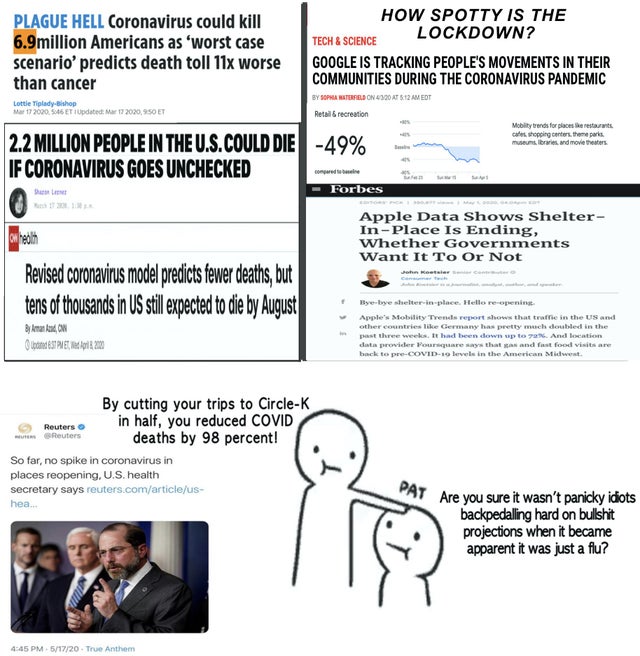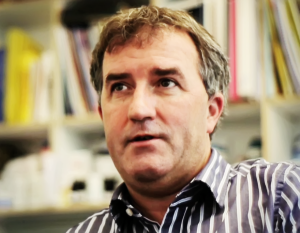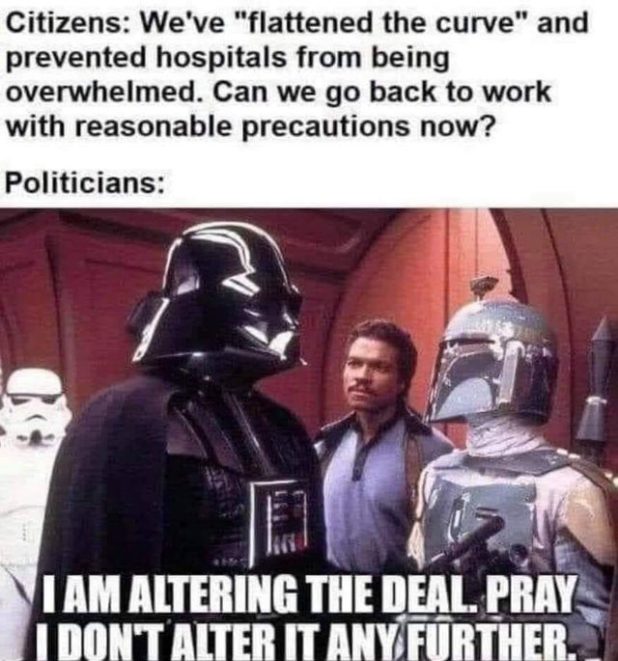Listen to the experts, they say.
Well, which experts are we supposed to listen to?
We could listen to academics who conjure doomsday death predictions out of computer models which consistently fail to materialize, like what they did with the global warming charts.
Or we could listen to NHS doctors who have actually written death certificates for suspected coronavirus patients, when they tell us that that system is completely untrustworthy.
Malcolm Kendrick, British doctor and author, writes for RT:
As an NHS doctor, I’ve seen people die and be listed as a victim of coronavirus without ever being tested for it. But unless we have accurate data, we won’t know which has killed more: the disease or the lockdown?
I suppose most people would be somewhat surprised to know that the cause of death, as written on death certificates, is often little more than an educated guess. Most people die when they are old, often over eighty. There is very rarely going to be a post-mortem carried out, which means that, as a doctor, you have a think about the patient’s symptoms in the last two weeks of life or so. You go back over the notes to look for existing medical conditions.
Previous stroke, diabetes, chronic obstructive pulmonary disease, angina, dementia and suchlike. Then you talk to the relatives and carers and try to find out what they saw. Did they struggle for breath, were they gradually going downhill, not eating or drinking?
If I saw them in the last two weeks of life, what do I think was the most likely cause of death? There are, of course, other factors. Did they fall, did they break a leg and have an operation – in which case a post-mortem would more likely be carried out to find out if the operation was a cause.
Mostly, however, out in the community, death certification is certainly not an exact science. Never was, never will be. It’s true that things are somewhat more accurate in hospitals, where there are more tests and scans, and suchlike.
Then, along comes Covid-19, and many of the rules – such as they were – went straight out the window. At one point, it was even suggested that relatives could fill in death certificates, if no-one else was available. Though I am not sure this ever happened.
What were we now supposed to do? If an elderly person died in a care home, or at home, did they die of Covid-19? Well, frankly, who knows? Especially if they didn’t have a test for Covid-19 – which for several weeks was not even allowed. Only patients entering hospital were deemed worthy of a test. No-one else.
What advice was given? It varied throughout the country, and from coroner to coroner – and from day to day. Was every person in a care home now to be diagnosed as dying of the coronavirus ? Well, that was certainly the advice given in several parts of the UK.
Where I work, things were left more open. I discussed things with colleagues and there was very little consensus. I put Covid-19 on a couple of certificates, and not on a couple of others. Based on how the person seemed to die.
I do know that other doctors put down Covid-19 on anyone who died from early March onwards. I didn’t. What can be made of the statistics created from data like these? And does it matter?
It matters greatly for two main reasons. First, if we vastly overestimate deaths from Covid-19, we will greatly underestimate the harm caused by the lockdown. This issue was looked at in a recent article published in the BMJ, The British Medical Journal. It stated: “Only a third of the excess deaths seen in the community in England and Wales can be explained by Covid-19.“
Business Insider, citing the Financial Times, reported that the UK has registered 59,537 more deaths than usual since mid-March. If, as the British Medical Journal claims, only one-third of excess deaths can be attributed to Corona, that would revise the official death count – claimed by worldometers to be 38,161, down to about 20,000.
The fact that such an estimation can change so quickly only serves to demonstrate the doctor’s basic assertion, made above – that they are just guessing who dies of Corona and who dies of something else, often without testing, and almost always without an autopsy.
Dr. Malcolm Kendrick
So far, there has been no large-scale random antibody testing to determine how many people have been infected, to compare to the estimates of death. Such a survey is reportedly underway by Imperial College London, and will be done in early June.
They are taking much longer than they need to to realize this test. New York, California, Germany, Spain, Moscow, to name a few places – have all already done this testing.
The Imperial College are the same people who famously made the hoax prediction that millions would die within weeks, and introduced the “flatten the curve” meme which has involved into the deindustrialization police state nightmare we are now experiencing.
They are clearly not in a hurry to demonstrate how wrong they were. It is reasonable to say that the British government is deliberately occulting information about asymptomatic infections from the public, by delegating that responsibility to a college of proven hoaxsters who are now dragging their feet.
Where random antibody testing has been done, it has consistently shown that the case fatality rate is much lower than the original projections. When it was done in Moscow, where they did autopsies to confirm cause of death, it was 0.124%, which is within the boundaries of a bad flu season.



